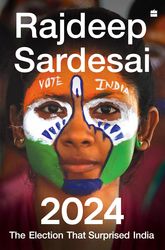IN EARLY 2023, journalist Rajdeep Sardesai began work on a book analysing the anticipated results of the 2024 Lok Sabha elections. Convinced of a predictable outcome, he tentatively titled the book Hat-trick. “Like so many others,” he writes in the introduction to the now-published book, “I, too, was swayed by the ‘Modi ki guarantee’ drumbeat and the event-driven ‘spectacle’ of his politics, convinced that the resource-rich BJP’s election machine would overwhelm all else.”
The actual results, Sardesai says, served as a wake-up call. Though it retained power, the BJP won only 240 seats, falling far below predictions and at least 40 fewer than Sardesai’s conservative estimate. “We journalists don’t put enough statutory warnings when we throw numbers at our readers,” Sardesai tells THE WEEK. “We say, ‘[This candidate] is winning, and this is the margin,’ and the viewer or reader is expected to believe that we know everything, when the truth of the matter is that we, too, at times, are struggling to unravel what’s really happening.”
The results, he says, was also humbling. “It’s time for a mea culpa,” he says, “so that we (journalists) can reboot… and refocus on what we do best, which is reporting.”
Retitled 2024: The Election That Surprised India, Sardesai’s new book offers a gripping account of the intense lead-up to this hard-fought election. Organised into fourteen chapters and an epilogue, the book boldly explores Indian politics, blending frontline despatches from election battlegrounds with candid glimpses of behind-the-scenes manoeuvring and a touch of light-footed punditry.
It also holds a mirror to the media. “My bigger worry,” Sardesai tells THE WEEK, “goes beyond the leaders. It’s about the nature and quality of our democracy, the misuse of money power, the misuse of Central agencies, the misuse of media power. Are we an electoral democracy with a level playing field? That, to me, is the more enduring question.”
Sardesai, a print journalist who became television’s first anchor-reporter-editor in the 1990s, is a keen observer of how television journalism and its emphasis on optics have fundamentally changed politics and the way it is practised. In the book, he recounts his meeting with Rakesh Tikait, son of farmer leader Mahendra Singh Tikait, during the peak of the farmer’s agitation. While his father was disdainful of electoral politics, Rakesh―who quit as a Delhi Police constable to join the movement―seemed to relish media attention. “Tikait had the perfect rustic look,” Sardesai writes, “dressed in a white kurta-dhoti with the green kisan ‘andolan’ (protest) cap on his head and green-white gamchha around his neck, beard unkempt and greying.” After delivering a speech to loud cheers, he tried to field Sardesai’s question about his specific objections to the laws that the farmers were protesting. Rakesh replied that such details were irrelevant, showing his cellphone and boasting that he had just spoken to Sharad Pawar. “From constable to serial agitator to full-fledged political leader,” writes Sardesai, “Tikait now clearly saw himself in the big league.”
A deeper problem that Sardesai diagnoses is the contradictions of power politics. He writes about how Prof Ashok Gulati, a leading economist who advocated wide-ranging agricultural reforms, shared his insights on how power politics was obstructing meaningful change. “Gulati was one of the experts consulted by the agriculture ministry,” writes Sardesai. “Interestingly, even Congress leader Rahul Gandhi spent an hour with him. ‘I pointed out to Rahul that Modi’s farm laws were more or less identical to what the Congress had proposed in its manifesto, so why not support them and take credit,’ said Prof Gulati. ‘But I guess competitive politics is a different ball game.’”
Sardesai says the absence of clear-cut ideological fault lines remains a challenge in Indian politics. “I wouldn’t say that there is no ideological fault line at all in India―there are, on certain issues like secularism,” he says. “There are certain core issues that seem to differentiate between parties. But, over time, ideology seems to matter less and less, because all that seems to matter at times is a power grab.”
In the book, Sardesai notes that the polls saw 114 former Congress members getting BJP tickets. The irony, he observes, is that it is a “Congress-yukt BJP” that talks about a “Congress-mukt Bharat”. “I think the problem is our party system,” he tells THE WEEK. “The party system in the west―the Republicans and Democrats in the US, for instance―is still intact. But, in India, the party system is broken. We need to fix it.”
Would a coalition of likeminded parties, like the INDIA bloc, be able to make a difference? “The basis of long-term politics cannot be just that ‘we have to defeat Prime Minister Narendra Modi at all costs,’” says Sardesai. “Long-term politics will have to be fashioned along your ability. The Congress, or a pan-Indian party like the Congress, will have to emerge to challenge Modi.”
Journalists, too, will need to up their game. “They have to ensure that they don’t get carried away by surround sound or echo chambers,” says Sardesai. “We need to restore our credibility by being more professional and keeping away from the hyper-polarised campaign that goes on around us. If we can do that, if we can be fairer in the way we cover both the opposition and the government, if we can simply hold whoever is in power accountable, we will have done a decent job.”
2024: THE ELECTION THAT SURPRISED INDIA
By Rajdeep Sardesai
Published by HarperCollins India
Pages 480; price Rs799



